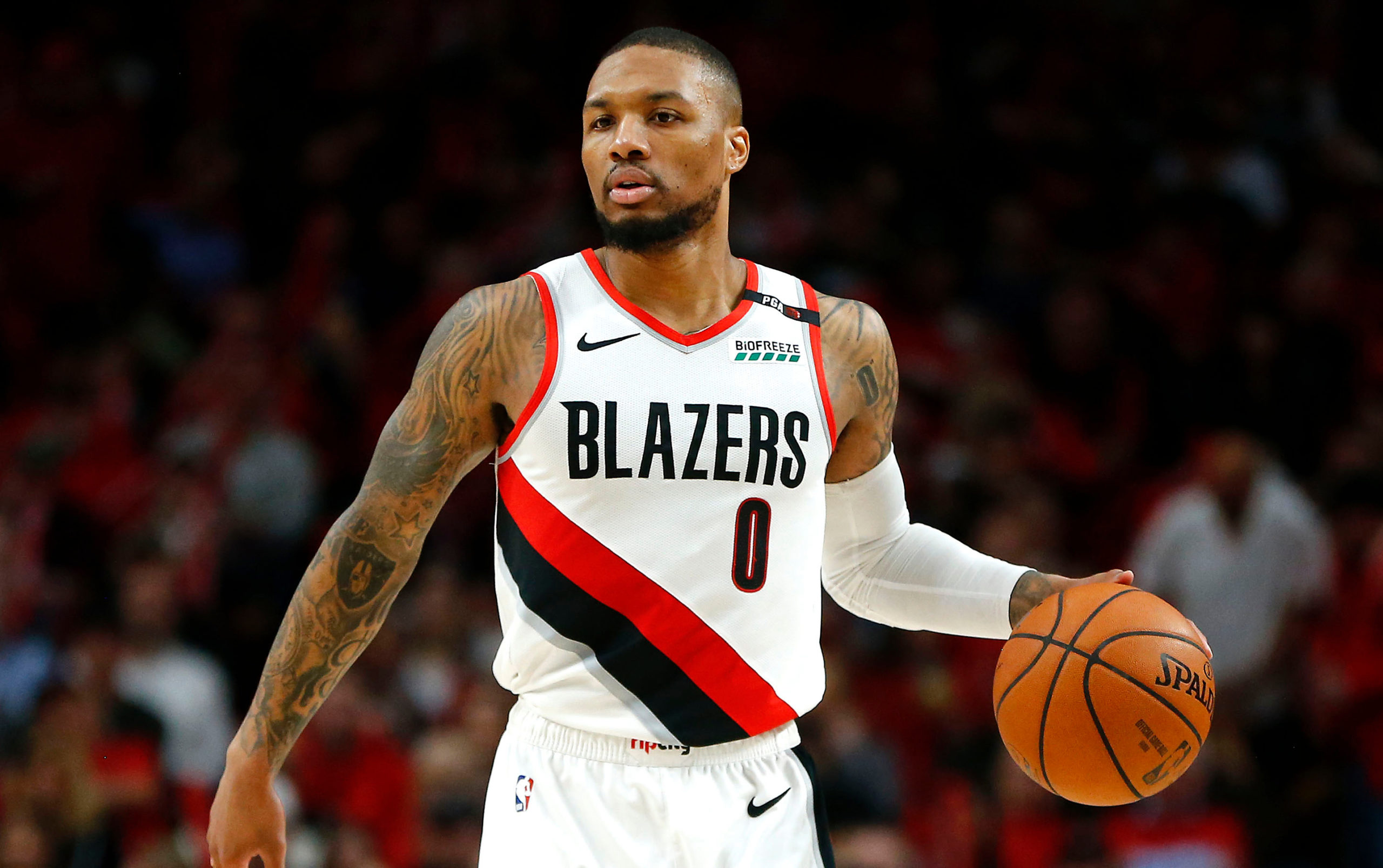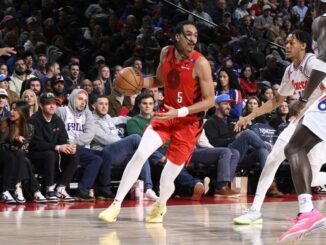
The old saying is that defense wins championships. Ignoring other sports, that saying is especially true in the NBA. Yes, you have to be able to score, but sooner or later you’re going to be matched up with a team that can scheme ways to slow your best scorers. To keep up with that team, you have to have guys that can slow their best players. Portland has had those types of above average or better defenders throughout the years, and historically when paired with elite scorers, those complete lineups have led to some of the best years in the team’s history.
In their championship season of 1977, Portland had at least four players that were considered above average defenders in Bill Walton, Maurice Lucas, Bob Gross, and Lionel Hollins. In the 1990-1992 seasons, Portland made it to the Finals twice and the conference finals once. They again had at least four players considered to be above average defenders in Terry Porter, Clyde Drexler, Jerome Kersey, and Buck Williams. As great as Portland was in those years, they had the misfortune of going head to head with three of the greatest dynasties (Pistons, Lakers, and Bulls) in the history of the sport, it’s amazing those teams were so close to those historic teams. That’s worth celebrating no matter what may be missing from the trophy case.
Portland didn’t make it back to the conference finals again until 1999, during the strike shortened season that also saw the launch of the Spurs dynasty. Portland actually had more than a few quality defenders that year in Damon Stoudamire, Jim Jackson, Isaiah Rider, Rasheed Wallace, Walt Williams, Brian Grant, and Arvydas Sabonis, but were sent home in four games. It was the Spurs, not many teams in NBA history would have had much luck with that team. For reference, the Shaq-Kobe Lakers faced the same Spurs team in the previous round and were also swept. The following year they drew the Los Angeles Lakers, and after swapping Williams for Scottie Pippen, had a starting roster legitimately capable of slowing the Lakers. They lost in a dramatic game seven (after going down 3-1 in the series), again facing one of the greatest dynasties in the history of the sport.
They did not return to the conference finals until 2019, and were led by a rag-tag bunch of quality players, and were not short on quality defenders either as Al-Farouq Aminu, Maurice Harkless, Enes Kanter were considered above average defenders. Yet again they were matched up with a historically great dynasty, this time the Golden State Warriors. It’s the same problem they have faced in every deep playoff run since 1977 – their best defender didn’t worry the best scorer on the other team.
Portland has had several above average or better defenders during Damian Lillard’s career, but perhaps the two best due to their ability to defend the perimeter were Wesley Matthews and Nicolas Batum, and that’s what has been missing in Portland since 2015 when Batum was traded to Charlotte and Matthews (while recovering from achilles surgery) was allowed to sign with Dallas in free agency. While neither player was named to an all-defensive team during their time here, that’s not uncommon in Portland. We know what we saw, they were elite defenders.
Lillard has developed into a very capable defender in his prime, and seems to get more involved with the defense every year. CJ McCollum has also been more aggressive on defense, and now third year player Gary Trent Jr has shown a lot of interest on defense, and if he keeps trending up, who knows what his ceiling might be. Wesley Matthews 2.0 perhaps? We can only hope. Currently Trent simply allows too many possessions to be converted into points, but he’ll get that sorted out if he keeps applying pressure to the other team.
Carmelo Anthony was once considered an above average defender, but either his willingness to apply himself or his athletic ability, or both have declined in recent years. He seemed to get back to his old self in the playoffs, and we’ll see if that is a new trend or an anomaly. Zach Collins has been solid when healthy, but if he’s not on the court, he can’t be a factor. We’ll see if this is the year he puts it all together when the team needs him most.
Scottie Pippen is considered by many fans as the all-time standard for individual perimeter defense in the NBA, allowing less than 100 points per 100 possessions four times in his career and an average of 102 for his entire time in the NBA. Dennis Rodman also had four seasons where he allowed less than 100 points per 100 possessions and averaged 100 over his career. Kawhi Leonard is a two time defensive player of the year award winner, and considered one of the best current defensive players in the league. He already has five seasons where he allowed less than 100 points per 100 possessions and has a career average of 100. His teammate Paul George averages 102, but none under 100 so far. Jimmy Butler averages 106, and LeBron James only has two seasons allowing less than 100 and averages 104 over his career. Kevin Durant averages 105, Klay Thompson 108.
Giannis Antetokounmpo is the current defensive player of the year award winner, and has allowed less than 100 points per 100 possessions in each of the last two seasons, averaging 104 over his career. The late Kobe Bryant was a great defender over the course of his career, averaging 105 points per 100 possessions, and had one year where he allowed less than 100. Draymond Green, another defensive player of the year award winner, has allowed less than 100 points per 100 possessions three times, and averages 102 over his career. Jrue Holiday is considered one of the best two-way players in the league, and has a career average of 108. Patrick Beverley, the bane of virtually every back court player in the league, has a career average of 108. Over his career, Wesley Matthews averages 109, Nic Batum 108.
Why are all of these numbers important? Here is why – Damian Lillard averages 111 points allowed every 100 possessions, and last year when he was playing perhaps the most aggressive defense of his career, that number spiked to 117 – the highest it’s ever been. That could be due to two things, one being that he was defending more often and therefore allowing himself to be scored on more, but the more likely scenario is the most difficult to swallow – his opponents saw him in front of them on a more consistent basis – and scored anyway.
Then there is CJ – a career average of 112, and last season it was 118, also his highest allowed so far. Again, I don’t think it was just that CJ was a more active defender, I think it has more to do with his opponents seeing him there and thinking they can still get to the basket – which has been true. We’ve seen game after game after game, we know CJ tries to cover his assignment, but the truth is that there are so many talented guards and forwards in the NBA and more specifically out West, that on a nearly nightly basis he’s being asked to guard or help guard one of the best scorers in the game today. Of the three of them, Melo is actually the better defender on paper (in addition to having a larger and longer frame to work with), but only slightly at 115 per 100 possessions. These are the best wings the team has, and none of them stand much of a chance at stopping the other side if they have at least two elite scorers, which more and more teams in the West have at least two if not more.
With the blockbuster trade GM Neil Olshey pulled the trigger on this week, they might finally have the chance to be the complete team many of us have envisioned for years. They’ve had defensive guys throughout, but it’s been rare they had one with this kind of pedigree.
Robert Covington is considered in most league circles to be an elite “3 and D” wing that can elevate the team defense of any roster. He’s near the same age as Damian and CJ at 29, so he’s not a young project where we’ll see results later. It’s actually a little scary how close he is in terms of his career and playing style to where Andre Iguodala was when he joined the Warriors in 2014 and the following year, helped them win their first championship in decades by harassing LeBron James and earning Finals MVP honors. Covington and Iggy have both only allowed 105 points per 100 possessions. Now Covington won’t have Draymond Green to support him, but he will have one or both of Jusuf Nurkic or Hassan Whiteside, two of the top rim protectors in the NBA, and ideally a healthy Zach Collins. You may recall the earliest version of the Warriors wasn’t that competitive without Green taking a huge leap forward and acquiring Iggy. That’s when they went from a nice little team with some upside to a dynasty in just two seasons, but there was a lot of work that went into it, including a coaching change and risky and significant roster changes.
Can the 2021 or 2022 Blazers be the next Warriors? It’s entirely possible. I don’t want to see Terry Stotts go anywhere, but then again, if it gets this team and this city to the Finals and bringing home another trophy? I’m not against it. I’m just glad the franchise is finally ready to do what they have to in order to give Damian Lillard the cast of players he deserves. If it’s all for nothing, hey, at least they tried. We’ve all talked about Olshey not making the moves this team needed. He finally sent another team some huge assets in exchange for a guy we need right now.
I hope it works out, but I’m mostly glad the move was made at all. I’d rather see the team give it everything they have at every level than have to wonder what might have been if they’d only been more aggressive. In my opinion, they sent two picks that don’t help right now and a guy in the twilight of his career (Trevor Ariza) for a guy that is in his prime and exactly the kind of player this team needs.
I don’t get to say this much, but good job Olshey. Now let’s see the team make it happen on the court.




